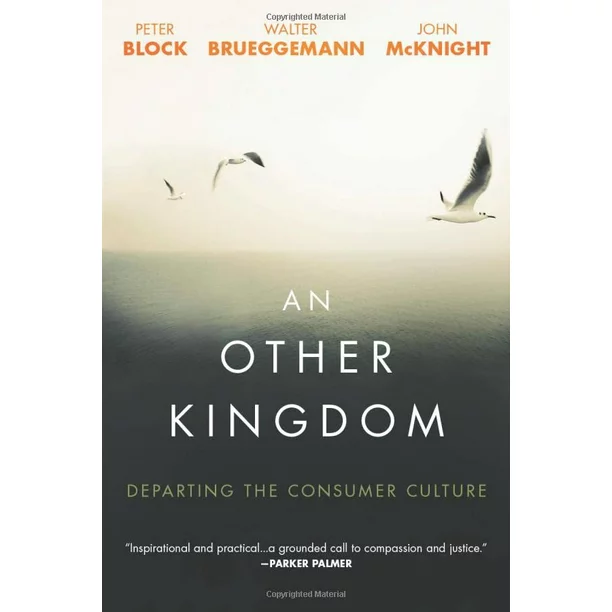 I am so thankful that John McKnight and Peter Block teamed up with Walter Brueggemann to write An Other Kingdom: Departing the Consumer Culture. If you appreciated Block and McKnight’s book The Abundant Community, with its thorough assessment of what makes communities work, or Brueggemann’s book Sabbath as Resistance: Saying No to the Culture of Now, you will love this book.
I am so thankful that John McKnight and Peter Block teamed up with Walter Brueggemann to write An Other Kingdom: Departing the Consumer Culture. If you appreciated Block and McKnight’s book The Abundant Community, with its thorough assessment of what makes communities work, or Brueggemann’s book Sabbath as Resistance: Saying No to the Culture of Now, you will love this book.
The authors start by reminding us of how we got to where we are today, “Large worldwide migration to the city, while driven by a desire for a better life, has the side-effect of separating people from their own culture, habits, memories, and ritual ways of living a life. The free market consumer ideology has produced a social disorder; people are no longer embedded in a culture that serves the common wealth, the common good. What was produced was a culture that abandoned subsistence living and the values of local economy; it became a market devoted to scale, speed, and cost. A culture where place, history, and tradition became irrelevant.”
They also expose the lie that undergirds our current dysfunction, “What sustains the class system, the empire, and the free market narrative is the myth of individual development. We cling to the hope that it serves the common good. It doesn’t. It does serve the individual. Beautifully. Community is the reconstruction of individual well-being through the well-being of the whole. This is very different from beginning with individual self-interest and believing that the invisible hand of the market will create communal well-being.”
They also name how we are perpetuating the lie, “In a consumer market system, the young are socialized into performance, entertainment, and acquisition. Not local place, local story, and communal memory.” The authors admit that if we depart the consumer culture, “Our children won’t be as wealthy as we are. That’s just fine. They will be healthier.”
This market narrative is built off the belief that, “You do not have enough, therefore you are not enough.” Reframing this narrative to “You are enough, and therefore you have enough" is the key to unraveling the whole system.
They offer these words of advice for how we can find our way back, “Part of the promise of restoring neighborhoods is to create local culture, with memory and affection, to replace what was left behind. A culture is language, food, faith, art, all intertwined.”
“There are disciplines that belong to community. They are built by covenantal language held together by vow rather than barter and honor the fact that community has a job to do and needs to be productive." "The neighborly Covenant rests on beliefs in Abundance, Mystery, Fallibility, and the Common Good.”
The authors also give us my favorite definition of the word community, “Community is people wrapped in a mystery. Community understands through their story, which gives shape and meaning to the mystery. Story honors our common experience.”
